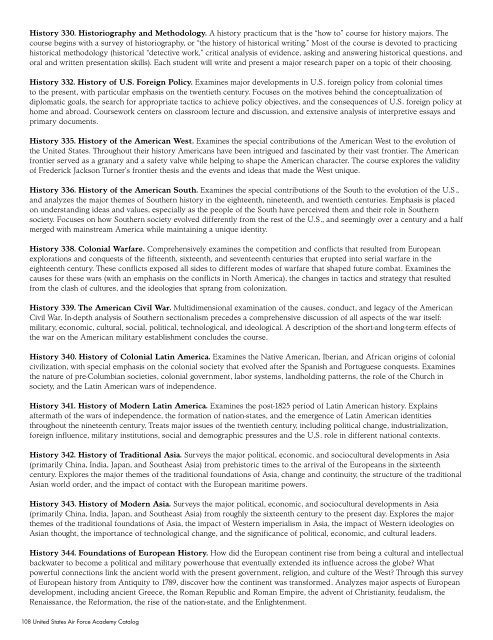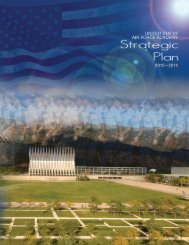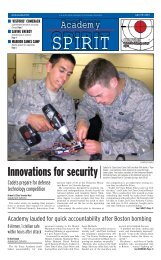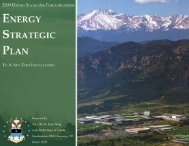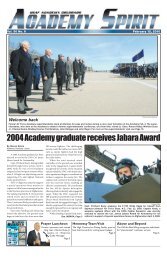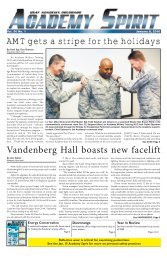2008-2009 Catalog - United States Air Force Academy
2008-2009 Catalog - United States Air Force Academy
2008-2009 Catalog - United States Air Force Academy
You also want an ePaper? Increase the reach of your titles
YUMPU automatically turns print PDFs into web optimized ePapers that Google loves.
History 330. Historiography and Methodology. A history practicum that is the “how to” course for history majors. The<br />
course begins with a survey of historiography, or “the history of historical writing.” Most of the course is devoted to practicing<br />
historical methodology (historical “detective work,” critical analysis of evidence, asking and answering historical questions, and<br />
oral and written presentation skills). Each student will write and present a major research paper on a topic of their choosing.<br />
History 332. History of U.S. Foreign Policy. Examines major developments in U.S. foreign policy from colonial times<br />
to the present, with particular emphasis on the twentieth century. Focuses on the motives behind the conceptualization of<br />
diplomatic goals, the search for appropriate tactics to achieve policy objectives, and the consequences of U.S. foreign policy at<br />
home and abroad. Coursework centers on classroom lecture and discussion, and extensive analysis of interpretive essays and<br />
primary documents.<br />
History 335. History of the American West. Examines the special contributions of the American West to the evolution of<br />
the <strong>United</strong> <strong>States</strong>. Throughout their history Americans have been intrigued and fascinated by their vast frontier. The American<br />
frontier served as a granary and a safety valve while helping to shape the American character. The course explores the validity<br />
of Frederick Jackson Turner’s frontier thesis and the events and ideas that made the West unique.<br />
History 336. History of the American South. Examines the special contributions of the South to the evolution of the U.S.,<br />
and analyzes the major themes of Southern history in the eighteenth, nineteenth, and twentieth centuries. Emphasis is placed<br />
on understanding ideas and values, especially as the people of the South have perceived them and their role in Southern<br />
society. Focuses on how Southern society evolved differently from the rest of the U.S., and seemingly over a century and a half<br />
merged with mainstream America while maintaining a unique identity.<br />
History 338. Colonial Warfare. Comprehensively examines the competition and conflicts that resulted from European<br />
explorations and conquests of the fifteenth, sixteenth, and seventeenth centuries that erupted into serial warfare in the<br />
eighteenth century. These conflicts exposed all sides to different modes of warfare that shaped future combat. Examines the<br />
causes for these wars (with an emphasis on the conflicts in North America), the changes in tactics and strategy that resulted<br />
from the clash of cultures, and the ideologies that sprang from colonization.<br />
History 339. The American Civil War. Multidimensional examination of the causes, conduct, and legacy of the American<br />
Civil War. In-depth analysis of Southern sectionalism precedes a comprehensive discussion of all aspects of the war itself:<br />
military, economic, cultural, social, political, technological, and ideological. A description of the short-and long-term effects of<br />
the war on the American military establishment concludes the course.<br />
History 340. History of Colonial Latin America. Examines the Native American, Iberian, and African origins of colonial<br />
civilization, with special emphasis on the colonial society that evolved after the Spanish and Portuguese conquests. Examines<br />
the nature of pre-Columbian societies, colonial government, labor systems, landholding patterns, the role of the Church in<br />
society, and the Latin American wars of independence.<br />
History 341. History of Modern Latin America. Examines the post-1825 period of Latin American history. Explains<br />
aftermath of the wars of independence, the formation of nation-states, and the emergence of Latin American identities<br />
throughout the nineteenth century. Treats major issues of the twentieth century, including political change, industrialization,<br />
foreign influence, military institutions, social and demographic pressures and the U.S. role in different national contexts.<br />
History 342. History of Traditional Asia. Surveys the major political, economic, and sociocultural developments in Asia<br />
(primarily China, India, Japan, and Southeast Asia) from prehistoric times to the arrival of the Europeans in the sixteenth<br />
century. Explores the major themes of the traditional foundations of Asia, change and continuity, the structure of the traditional<br />
Asian world order, and the impact of contact with the European maritime powers.<br />
History 343. History of Modern Asia. Surveys the major political, economic, and sociocultural developments in Asia<br />
(primarily China, India, Japan, and Southeast Asia) from roughly the sixteenth century to the present day. Explores the major<br />
themes of the traditional foundations of Asia, the impact of Western imperialism in Asia, the impact of Western ideologies on<br />
Asian thought, the importance of technological change, and the significance of political, economic, and cultural leaders.<br />
History 344. Foundations of European History. How did the European continent rise from being a cultural and intellectual<br />
backwater to become a political and military powerhouse that eventually extended its influence across the globe? What<br />
powerful connections link the ancient world with the present government, religion, and culture of the West? Through this survey<br />
of European history from Antiquity to 1789, discover how the continent was transformed. Analyzes major aspects of European<br />
development, including ancient Greece, the Roman Republic and Roman Empire, the advent of Christianity, feudalism, the<br />
Renaissance, the Reformation, the rise of the nation-state, and the Enlightenment.<br />
108 <strong>United</strong> <strong>States</strong> <strong>Air</strong> <strong>Force</strong> <strong>Academy</strong> <strong>Catalog</strong>


